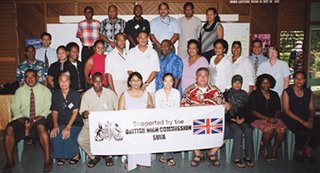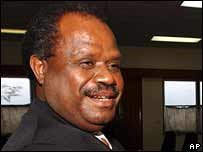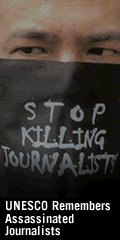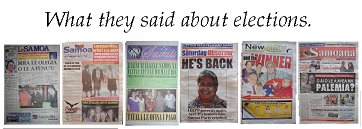Pacific Media reps gather for elections workshop
 With four Pacific nations preparing to go the polls in the coming months some 35 media representatives from the region gathered in Suva, Fiji in March for a three-day UNESCO supported workshop on media and elections.
With four Pacific nations preparing to go the polls in the coming months some 35 media representatives from the region gathered in Suva, Fiji in March for a three-day UNESCO supported workshop on media and elections.The workshop was a project initiated by the Democracy and Electoral Studies Programme of the Pacific Institute of Advanced Studies in Development and Governance at the University of the South Pacific in collaboration with the Fiji Electoral Commission/Elections Office, the Communication & Information Sector of the UNESCO Office, Apia and The British High Commission, Suva. Newly appointed British High Commissioner to Fiji, Roger Sykes in opening the workshop told journalists from Fiji, Tonga, Samoa, Solomon Islands and Tuvalu that their role during upcoming elections in their home country’s would be of "vital importance". The workshop was aimed at addressing media practices ahead of elections in Samoa on March 31, Solomon Islands on April 5, Fiji on May 6 and Tuvalu on August 3. Areas covered included an overview of democratic elections, media/elections laws and regulations, human rights and elections, electoral systems, good journalism in election coverage, campaign, polling and counting coverage, ethics and codes of conducts for media election coverage and women’s’ political representation and election coverage. Forum Secretariat's deputy Secretary General (Economic Growth and Security) Peter Forau highlighted the importance of the media as part of the democratic process. "Elections define democracy while the media enlightens and sustains it," Mr Forau said in his keynote address. The role of the media is to provide information, educate and provide opportunities for citizens to question government and propose alternative policy ideas, he said. Fiji TV news director Netani Rika went a step further warning journalists to trust no one and be wary of politicians and political parties during election time. "Ask the tough question now," he said and deal with the issues not the personalities. He said it was too common around election time for the media to get caught up in stories based on allegations, not facts. Participating at the workshop were two journalists each from Samoa, Tuvalau , Solomon Islands, one from Tonga and 28 from Fiji. This is the second of such workshops to be held in Fiji, the initial one organised for Fiji participants only. A third is in the planning for the forthcoming General Elections in Tuvalu.
Source: UNESCO News
Link: http://portal.unesco.org/ci/en/ev.php-URL_ID=21822&URL_DO=DO_TOPIC&URL_SECTION=201.html
Courtesy of Abel Caine




